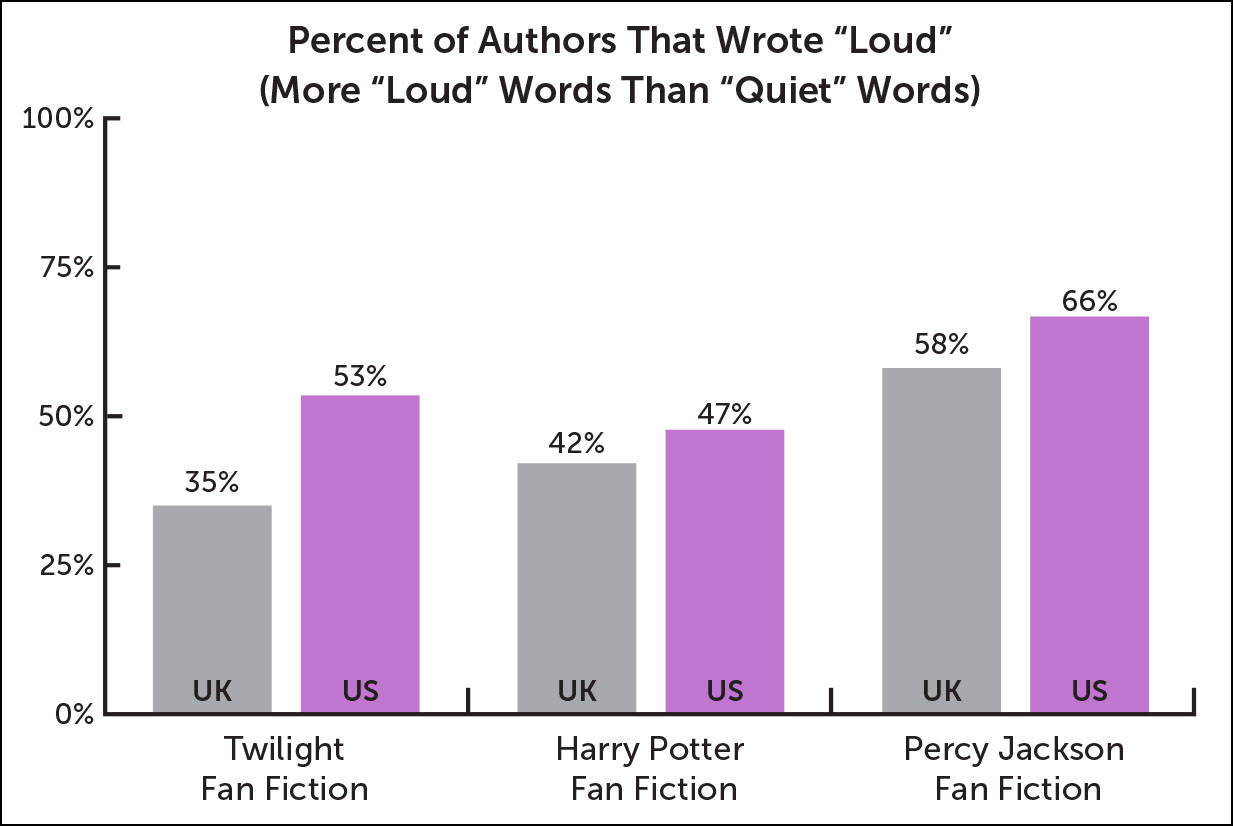
If you are familiar with the Rowling novels, you might start to hypothesize about what contributes to their “quietness.” Does the fact that much of the action in the series revolves around sneaking about Hogwarts have anything to do with this? If so, does this make the novels appear more “quiet” than they are? Or is the “quiet” sneaking action a perfect example of the subdued action compared to an American series?
The results are interesting to speculate about, but it’s a small sample with too much variance among genre and time to offer a comparison between Americans or Brits as a whole. The ideal sample would be narrow in terms of genre and subject matter, and in terms of time period—with plenty of authors from both the U.K. and the U.S. So, back to the fan fiction.
The three story universes with the most entries on FanFiction.net are Harry Potter, Twilight, and Percy Jackson. I downloaded all stories written in each genre that were full-length (60,000-plus words), which amounted to 284 million words over 2,225 stories.
Twilight was on the quiet side. Within its fan fiction, however, there is a marked difference between its American writers and its writers from the United Kingdom. Overall American writers are indeed louder.
There are many ways we could slice the results. I categorized fan-fiction novels into being either “loud” or “quiet” based on whether they were more than 50 % “loud.” For example, all of Dan Brown’s Robert Langdon books are “loud” because they have more “loud” verbs than “quiet.” While around one-third of British Twilight writers were loud, over one-half of all Americans were. If we look at Harry Potter and Percy Jackson, the results are consistent, even if the magnitude is less. In the huge sample of thousands of stories, there are many more “loud” American writers than “loud” British writers.
So do these results mean that Americans are in fact louder in their writing than the quiet Brits? I would argue that it does. In samples of hundreds of millions of words by thousands of individuals Americans come out “louder” than Brits.
The fifty writers I’ve been looking at showed no conclusive results, but if you look at other large fiction samples, the small but noticeable pattern we find in fan-fiction stays true. I took the British National Corpus (BNC) and the Corpus of Contemporary American English (COCA) and looked at how “loud” and “quiet” words were used. These samples don’t allow for as perfect a comparison as fan fiction, but they are similar. Both corpuses contain hundreds of millions of words and both cover a similar modern time period (1980–1993 for BNC and 1990–2015 for COCA). I looked at just the “fiction” texts in each sample. Because the corpuses are based on texts that the researchers from different institutions choose to include, it’s possible one could end up having more thrillers, or more romances, or more young adult, or more literary fiction.
Still they are huge samples that are used to compare general trends in language. If the BNC showed that Brits were louder than Americans, you might doubt the fan-fiction sample above. However, this comparison confirms the finding. For every word with a “loud” or “quiet” value in the British sample, 66 % were “loud.” In the American sample, 73 % were “loud.” It’s not deafening, but if you listen, you can hear a difference.
I. This is based on my count. Books have multiple settings. This includes all books that have any action taking place in Maine.
II. For these numbers and the chart above, author nationality is not always singular or certain. The country the author identified with or spent most time writing in was selected.
III. According to 2014 article “The American Cinema: A Cultural Imperialism?”